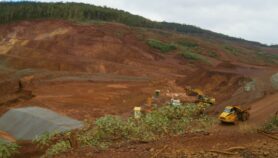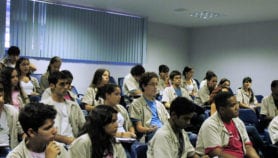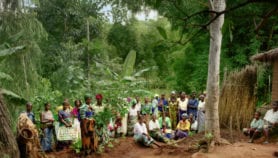By: David Dickson
Send to a friend
The details you provide on this page will not be used to send unsolicited email, and will not be sold to a 3rd party. See privacy policy.
Supporters of traditional knowledge argue that one of its strengths is the extent to which it is tied to specific cultural contexts. The idea that this may not be the case enhances the opportunity for productive interaction with modern science.
When a group of farmers in Ghana told foreign agricultural experts that there was a tree under which their crops grew well — and that this was because the water needed by the crops was provided by the tree itself — they were met with considerable scepticism. After all, trees use their roots to suck water up from the ground into their leaves, from which it evaporates into the atmosphere. As a result, the ground underneath them tends to be drier not wetter.
But it turned out that not only was the farmers’ account genuine, so too was their explanation. For the tree in question has a root system that siphons up water both into its trunk, and also into the surrounding earth. To social scientists, it was one more indication that there are many ways in which modern agricultural science ignores the 'traditional knowledge' of local farming communities at its peril. It also appeared to confirm one of the key characteristics of such traditional knowledge, namely that it 'belongs to' the local communities out of whose practical experience it has emerged.
What, then, is one to make of the fact that the same effects of trees that provide water for crops — and indeed the same explanation — is also known to hill farmers in Nepal? One implication, as Fergus Sinclair from the University of Wales, Bangor, told the annual meeting of the British Association for the Advancement of Science in Salford last week, is that traditional knowledge may, in practice, be more universal than many social scientists like to think. And this pours some cold water on the suggestion that one of the key distinctions between traditional knowledge and modern science is the extent to which the former is embedded in local culture, while the latter is independent of local cultures and is valid for all societies.
The modern value of traditional knowledge
The lesson is an important one. In recent years, there has — quite rightly — been a steadily growing recognition that, in fields from medicine to agriculture, the modern world has paid a high price for rejecting traditional practices and the knowledge, however it is expressed, that underpins them. Where this knowledge conflicts with what is often referred to as the 'modern scientific world view', it has tended to be discarded as little more than superstition. Its lack of an apparently rational basis is itself seen as a reason for ignoring it, without adequate awareness that the rationality test being applied is itself a cultural product of Western societies.
This view is now changing — and the damage it has done in the recent past is being acknowledged. In a separate presentation to the British Association, Gerry Bodeker of the University of Oxford, described the failure of US scientists in the 1940s to develop an anti-malarial drug from a traditional Chinese remedy based on extracts of the plant Dichroa febrifuga. The apparent problem with the drug was that it induced such violent nausea that patients refused to take it. But the US researchers were unaware that, when used as a malaria treatment in China, the remedy was administered with other ingredients such as ginger and liquorice root, both powerful anti-emetics. As Bodeker pointed out, a less reductionist approach that had taken such information on board might have saved millions of lives in the intervening period.
While recognising the continued relevance of much traditional knowledge, however, it is also important — as Sinclair and his colleagues warn — not to over-romanticise it. For example, some claim that traditional knowledge has an innate superiority over modern science. They argue that such superiority results from the fact that traditional knowledge is embedded in local, traditional cultures, and therefore reflects the virtues of such cultures in a way that modern science does not.
There are certainly some powerful elements of truth in such arguments. For example, many traditional farming communities have shown a much greater interest in the need to preserve long-term soil productivity and ecosystem balance — sometimes described as a 'respect for nature' — than their chemical-wielding successors. But there are also dangers, perhaps the biggest being the tendency for this argument to slip into simplistic sloganising that says traditional knowledge is good and modern science is bad.
The need for mutual recognition
These dangers are not restricted to what one might call the more traditional forms of traditional knowledge. The meeting of the British Association also saw the launch of a new organisation, the Foundation for Science, Technology and Civilisation. The new organisation has been set up primarily to promote interest in the achievements of scientists and engineers from the Muslim World. Too often, according to its chairman, Salim Al-Hassani, professor of mechanical engineering at the University of Manchester's Institute of Science and Technology, such achievements have been ignored or forgotten by those who write the history of science. This is typified by what is described as a ‘black hole’ in the history of European Civilisation in the period between the Romans and the Renaissance — a description that ignores the vitality of Muslim culture (and science) during this period.
The complaint is a legitimate one, up to a point; but it should not be taken too far. Few mathematicians are unaware that algebra was invented in the Muslim world, just as few modern tourists fail to recognise the architectural wonders of the Ottoman Empire. But should these today be applauded as feats that reflect — and therefore promote — the values of Muslim culture? Or essentially as achievement of human endeavours that are at least partially independent of the cultures in which they were born?
There are no black-and-white answers to such questions; there are always times when a culture reinforces the achievements of individuals, and others when it seeks to undermine them (think of the experiences of Galileo). Perhaps the best that one can hope for is an expansion of the cultural tolerance familiar in the arts, ironically ever since so-called 'modern' artists of the late 19th century began to draw inspiration from the directness and expressionism of 'primitive' carvings.
This does not mean that when traditional knowledge claims to be 'scientific', it is wrong to apply some of the criteria — such as reproducibility — used to scrutinise the claims of contemporary scientists. But it does mean, as Sinclair emphasised in Salford, that one should not paint a picture of traditional knowledge that is too rosy. The real challenge is to find ways that both science and traditional knowledge can work in a complementary fashion towards improving human well-being, not in asserting the primacy of the respective cultures out of which they have developed.













